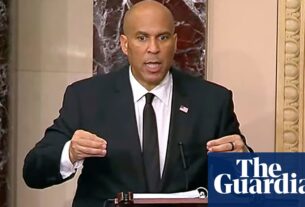Introduction: UK jobs report shows wage growth slowdown, as vacancies drop
Good morning, and welcome to our rolling coverage of business, the financial markets and the world economy.
Wage growth across the UK has slowed, and the number of people on payrolls has fallen, as Britain’s jobs market continues to cool.
The latest UK labour market data, just released, shows that average regular earnings (excluding bonuses) rose by 5.6% in January to March 2025, down from 5.9% in the previous quarter.
Growth in pay including bonuses also slowed – it rose by 5.5% in January-March, down from 5.7% in the final three months of 2024.
In January to March 2025, average weekly earnings were up 5.6% on the year excluding bonuses and 5.5% including bonuses. Regular pay grew fastest in the retail and hospitality sector.
Read the release ➡️ https://t.co/fGCmGWT23L pic.twitter.com/nubYNHu2bY
— Office for National Statistics (ONS) (@ONS) May 13, 2025
Although wages growth slowed, earnings are still rising faster than prices in the shops. Once you adjust for inflation, pay (both regular and total) rose by 2.6% per year on both measures.
Minister for Employment, Alison McGovern has said:
“Real wages are growing with around 200,000 more people into work since the publication of our Get Britain Working plan.
“But we know that the Government’s Plan for Change needs more workers – in every part of our country. That’s why we will continue to change Jobcentres, invest in British industry, and get help to those who need it until everyone who can work has got a decent job and a good income.”
But, today’s report also shows a drop in demand for workers, as UK companies adjust to the increase in the minimum wage, and higher national insurance contributions, which kicked in at the start of April.
The Office for National Statistics reports that the number of payrolled employees felled by 33,000 in April, following a 47,000 drop in March.
On an annual basis, there were 106,000 fewer payrolled employees in April than a year ago, the ONS estimates.
In another sign that firms are being cautious, the number of vacancies in the UK fell by 42,000 in the January-March quarter, the 34th consecutive quarterly decline in a row. The biggest fall came in the construction sector
ONS director of economic statistics Liz McKeown says:
“Wage growth slowed slightly in the latest period but remains relatively strong, with public and private sectors now showing little difference.
“The broader picture continues to be of the labour market cooling, with the number of employees on payroll falling in the first quarter of the year. The number of job vacancies has also fallen again, with the rate of decline increasing in the last few months.”
The agenda
-
7am BST: UK labour market report
-
10am BST: ZEW survey of eurozone economic confidence
-
10am BST: Environment, Food and Rural Affairs Committee (EFRA) to quiz the CEO, CFO and Chair of Thames Water
-
1.30pm BST: US inflation report for April
Key events
The increased cost of hiring workers in the UK is continuing to dampen the job market, according to the Institute of Directors.
Alex Hall-Chen, Principal Policy Advisor for Employment at the Institute of Directors, says:
“Today’s figures indicate declining employer demand for labour in the UK job market, with the number of payrolled employees decreasing on the month by 0.1% and vacancies falling by 42,000 on the quarter.
“The business case for hiring has been weakened by a perfect storm of last month’s increased employer National Insurance Contributions and above-inflation increases to the minimum wage, alongside a wave of measures in the Employment Rights Bill which will make hiring staff riskier and costlier.
“If the government is to achieve its aim of an 80% employment rate, it must take urgent action to restore business confidence in hiring. We urge the government to support targeted changes to the Employment Rights Bill which would ensure that the Bill works for both businesses and employees.”
Economists: cracks appearing in UK jobs market
Economists are concerned that the UK’s jobs market appears to have cooled in recent months, judging by today’s labour statistics.
Suren Thiru, ICAEW economics director, fears the employment market is cooling, saying:
“April’s drop in payrolled employment and unemployment rate increase suggests that cracks in the labour market are widening as the double whammy of rising National Insurance and National Living Wage hit employers, exacerbated by elevated global uncertainty.
“While wage growth remains uncomfortably high, the downward pressure from a struggling economy, softening jobs market and rising employment costs should help put pay settlements on a firmer downward path.
“Although more difficult times lie ahead for the jobs market with sinking business confidence and rising employment costs likely to drive a modest rise in unemployment, any increase should be limited by longstanding employer concerns over skills shortages.
“This growing softness in the labour market is unlikely to be sufficient to persuade rate setters to depart from their current approach to gradually cutting interest rates, given lingering concerns over inflation and heightened global uncertainty.”
Paige Tao, economist at PwC UK, suggests the weakening jobs market could spur the Bank of England towards further interest rate cuts:
“If last month’s labour market data hinted at an early response to upcoming employer tax rises, this month’s figures confirm a clearer weakening. Unemployment ticked up for the first time in four months by 0.1 percentage point, payrolled employment fell by 33,000, and vacancies dropped further — staying below pre-pandemic levels for a second straight month. Heightened uncertainty around U.S. tariffs have likely added to the drag on business confidence.
“Wage growth has cooled, with annual earnings including bonuses easing by 0.2 percentage points in March — suggesting fading inflationary pressures from pay in advance of April’s tax changes. As the Bank of England continues to balance inflation risks with growing weakness in the UK growth outlook, today’s figures may indicate a green light for another rate cut at next month’s MPC meeting.”
Lindsay James, investment strategist at Quilter, fear today’s jobs report may be “the start of the expected slowdown”, adding:
The unemployment rate ticked up slightly to 4.5% in January to March 2025, while payrolled employee numbers fell by 47,000 between February and March 2025 and by 63,000 between March 2024 and March 2025. Job vacancies also dropped by 42,000 on the quarter to 761,000 in February to April 2025, marking the 34th consecutive quarterly decline.
“Growth in regular pay, excluding bonuses, fell to 5.6% between January and March 2024, as did total pay, including bonuses, which dipped marginally to 5.5%. Despite the slight fall, with inflation currently at 2.6%, wage growth is still outpacing inflation at more than double the rate.
UK unemployment rate highest since summer 2021
The UK’s unemployment rate has risen to its highest in almost four years, today’s labour market data shows.
At 4.5% in January-March, the jobless rate for those aged 16 and over was the highest since June-August 2021, when it was also recorded at 4.5%.
⚠️ The single-month UK unemployment rates for Feb & Mar have been the highest since the pandemic. Even if we stay around these single month rates, the official UK unemployment rate is heading to at least 4.6%. Risks are skewed towards 5% earlier than the BoE forecasts $GBP pic.twitter.com/v7US8o0sU8
— Viraj Patel (@VPatelFX) May 13, 2025
Nicholas Hyett, investment manager at Wealth Club, says:
“The UK Labour market is painting a bit of a mixed picture. On the one hand unemployment is a touch higher than last month and vacancies are also shrinking. On the other, wages continue to grow well ahead of inflation, with sectors like retail, hotels and restaurants showing particular wage strength.
That doesn’t bode well for businesses in the labour intensive hospitality and retail sectors – with higher wages and looming tax change both likely to push up costs. Fortunately a broad rise in wages suggests the consumer will be able to stomach some extra costs from higher prices.
Here are more key facts from this morning’s jobs report:
-
The UK employment rate for people aged 16 to 64 years was estimated at 75.0% in January to March 2025. This is above estimates of a year ago, but largely unchanged in the latest quarter.
-
The UK unemployment rate for people aged 16 years and over was estimated at 4.5% in January to March 2025. This is above estimates of a year ago, and up in the latest quarter.
-
The UK economic inactivity rate for people aged 16 to 64 years was estimated at 21.4% in January to March 2025. This is below estimates of a year ago, and down in the latest quarter.
Introduction: UK jobs report shows wage growth slowdown, as vacancies drop
Good morning, and welcome to our rolling coverage of business, the financial markets and the world economy.
Wage growth across the UK has slowed, and the number of people on payrolls has fallen, as Britain’s jobs market continues to cool.
The latest UK labour market data, just released, shows that average regular earnings (excluding bonuses) rose by 5.6% in January to March 2025, down from 5.9% in the previous quarter.
Growth in pay including bonuses also slowed – it rose by 5.5% in January-March, down from 5.7% in the final three months of 2024.
In January to March 2025, average weekly earnings were up 5.6% on the year excluding bonuses and 5.5% including bonuses. Regular pay grew fastest in the retail and hospitality sector.
Read the release ➡️ https://t.co/fGCmGWT23L pic.twitter.com/nubYNHu2bY
— Office for National Statistics (ONS) (@ONS) May 13, 2025
Although wages growth slowed, earnings are still rising faster than prices in the shops. Once you adjust for inflation, pay (both regular and total) rose by 2.6% per year on both measures.
Minister for Employment, Alison McGovern has said:
“Real wages are growing with around 200,000 more people into work since the publication of our Get Britain Working plan.
“But we know that the Government’s Plan for Change needs more workers – in every part of our country. That’s why we will continue to change Jobcentres, invest in British industry, and get help to those who need it until everyone who can work has got a decent job and a good income.”
But, today’s report also shows a drop in demand for workers, as UK companies adjust to the increase in the minimum wage, and higher national insurance contributions, which kicked in at the start of April.
The Office for National Statistics reports that the number of payrolled employees felled by 33,000 in April, following a 47,000 drop in March.
On an annual basis, there were 106,000 fewer payrolled employees in April than a year ago, the ONS estimates.
In another sign that firms are being cautious, the number of vacancies in the UK fell by 42,000 in the January-March quarter, the 34th consecutive quarterly decline in a row. The biggest fall came in the construction sector
ONS director of economic statistics Liz McKeown says:
“Wage growth slowed slightly in the latest period but remains relatively strong, with public and private sectors now showing little difference.
“The broader picture continues to be of the labour market cooling, with the number of employees on payroll falling in the first quarter of the year. The number of job vacancies has also fallen again, with the rate of decline increasing in the last few months.”
The agenda
-
7am BST: UK labour market report
-
10am BST: ZEW survey of eurozone economic confidence
-
10am BST: Environment, Food and Rural Affairs Committee (EFRA) to quiz the CEO, CFO and Chair of Thames Water
-
1.30pm BST: US inflation report for April



